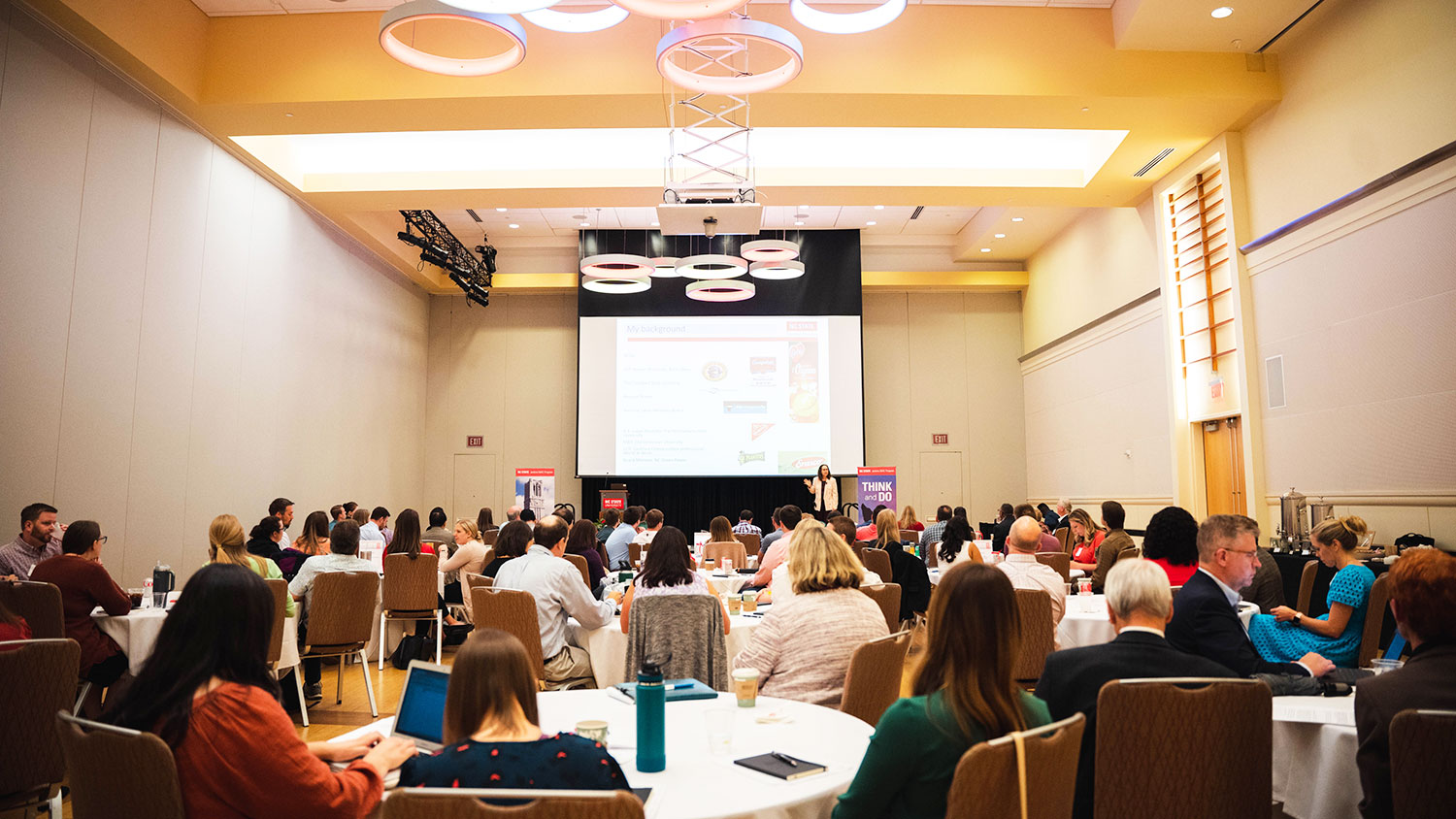Jenkins MAC Alumni and Regional Accountants Gather for 2nd Lifelong Learning Summit
The event featured presentations by Poole College faculty and industry experts on emerging issues in accounting and business.

By Samantha Beavers
On Friday, Sept. 22, nearly 90 accountants gathered at Talley Student Union for Poole College of Management’s second Jenkins Master of Accounting (MAC) Lifelong Learning Annual Summit. Hosted in collaboration with NC State Executive Education, the event not only afforded accountants the opportunity to earn continuing professional education (CPE) credit, but allowed attendees to raise questions, exchange ideas and network with other accounting professionals in the region.
The summit brought together Jenkins MAC alumni from 23 different graduating classes, ranging from 1996 to 2023, and featured presentations by Poole College faculty and industry experts on emerging issues in accounting and business.
“The purpose of this summit is to give you an opportunity to experience topics and individuals you probably wouldn’t get any other way,” said Scott Showalter, Jenkins MAC director, to attendees while opening the event.
‘The Language of Business’
The event kicked off with a keynote presentation featuring Tracey Golden, former chair of the American Institute of Certified Public Accountants (AICPA), and husband Russell Golden, former chair of the Financial Accounting Standards Board (FASB). The two CPAs shared about how they found their career starts, and one another, at Deloitte – and discussed key leadership insights, opportunities and lessons learned from their careers.
“Every day, I went to work and tried to be better than the day before. I tried to ask questions, learn and do work above what my pay grade was to show people how I was ambitious and creative. I took risks and embraced challenges,” Russell Golden said.
The couple also discussed the critical role accounting plays in society and why building a pipeline of accountants through better storytelling is so essential.
Without accounting, Russell Golden said, businesses cannot allocate capital, experience growth or employ people – and despite its reputation for being boring, difficult and requiring accountants to work long hours, it can set individuals up for successful and satisfying careers.
“It’s not boring – it lays the foundation for everything you need in business and in life. It’s not too hard. People can figure it out. And honestly, sometimes things that are hard are very rewarding and lucrative,” he said. “A lot of CEOs and entrepreneurs, when you talk to them, [say] they majored in accounting. So, if you start in accounting, you can go anywhere. And as for working too hard – that’s changing.”
Reflecting on how she decided to major in accounting at Georgetown University, Tracey Golden said, “I looked at the different majors in the business school and asked, ‘What’s the most versatile one? What can I do anything with?’ It was accounting. Accounting is the language of business.”
Digging Into ChatGPT
In the next presentation on artificial intelligence (AI) and ChatGPT, Bill Rand, McLauchlan Distinguished Professor of Marketing and executive director of the Business Analytics and AI Initiative, explained how ChatGPT works and how companies can leverage the tool to drive their business forward.
“All ChatGPT is really doing is taking your input and saying, ‘How would someone who is a human respond to this question?’ It looks at all this stuff on the internet and tries to put together what makes sense,” Rand said.
According to Rand, the “zero to one” problem is particularly difficult for humans, which is why professionals can add a lot of value with ChatGPT. Using the tool can save them time and help them take the first step in generating content, and then they can refine the content to serve its intended purpose. To get even better results, users can learn to write better prompts for their inputs and become “conversational” with the tool to continue the process of refining the content.
“AI does not replace jobs. It replaces tasks. I think about it like a spreadsheet. Obviously, accountants touch spreadsheets all the time – but nearly everyone uses a spreadsheet at some point in the day-to-day operations of their business,” Rand explained. “I think AI will be similar. You won’t be using it every day, but you’ll use it on a regular basis. So, AI will not take your job, but someone who knows how to work with AI will take your job – because it makes everyone 10 times more productive.”

Following Rand’s presentation, Terrell Turner, a North Carolina CPA, founder of TLTurner Group and social media influencer with more than 13,000 followers, shared how to prepare for success as an entrepreneur – and explained why accounting uniquely prepares individuals for entrepreneurial success.
“The basis of being an entrepreneur is understanding a problem other people have that they’re willing to pay something to find a solution to – and then solving that problem and building a business around that solution,” Turner said. “And accountants are far better than [others] at asking, ‘Is this solution going to make financial sense?’”
Over lunch, attendees had the opportunity to hear from Fran Lawrence, NC State controller and Jenkins MAC ‘96, about her career journey, memories from the Jenkins MAC program and her day-to-day responsibilities in the NC State Controller’s office.
The afternoon continued with a presentation by Beth Ritter, professor of practice of human resource management, on conflict resolution. Ritter kicked off her presentation by asking attendees to play a game at their tables, and it quickly became obvious that the goal of the game was unclear.
“You weren’t sure whether the goal was to win as a team or as individuals — and this happens at work, right? When it comes to conflict, one of the first things to do is say, ‘Let’s get clear on what the goal is,’” Ritter explained.
She then gave an overview of common triggers for conflict in the workplace, including organizational structure, limitations of resources, task interdependence, goal incompatibility, personality differences and communication challenges. Additionally, Ritter presented the Dual Concerns model, developed by Dean Pruitt and Peter Carnevale, that discusses the relationship between two concerns: a concern to achieve a desired outcome and a concern for the current and future relationship with the other party. Depending on the level of concern for each, she explained, individuals tend toward either collaboration, accommodation, competition or avoidance.
The summit concluded with a tax update panel with Nathan Goldman, associate professor of accounting, and Robert Broome, director of advocacy for the North Carolina Association of CPAs, followed by an ethics session led by Hunter Cook, partner at Dixon Hughes Goodman LLP, that fulfilled North Carolina CPA’s mandatory annual CPE requirement.
“As an accountant, you have to get CPE credits – but I like that instead of sitting behind a computer, this event gives you the opportunity to hear from people in the field and connect with people from the MAC program,” said Mariia Zubach, Jenkins MAC ‘19, and partner at Schaffer, Baum and Zubach PLLC.
- Categories:


